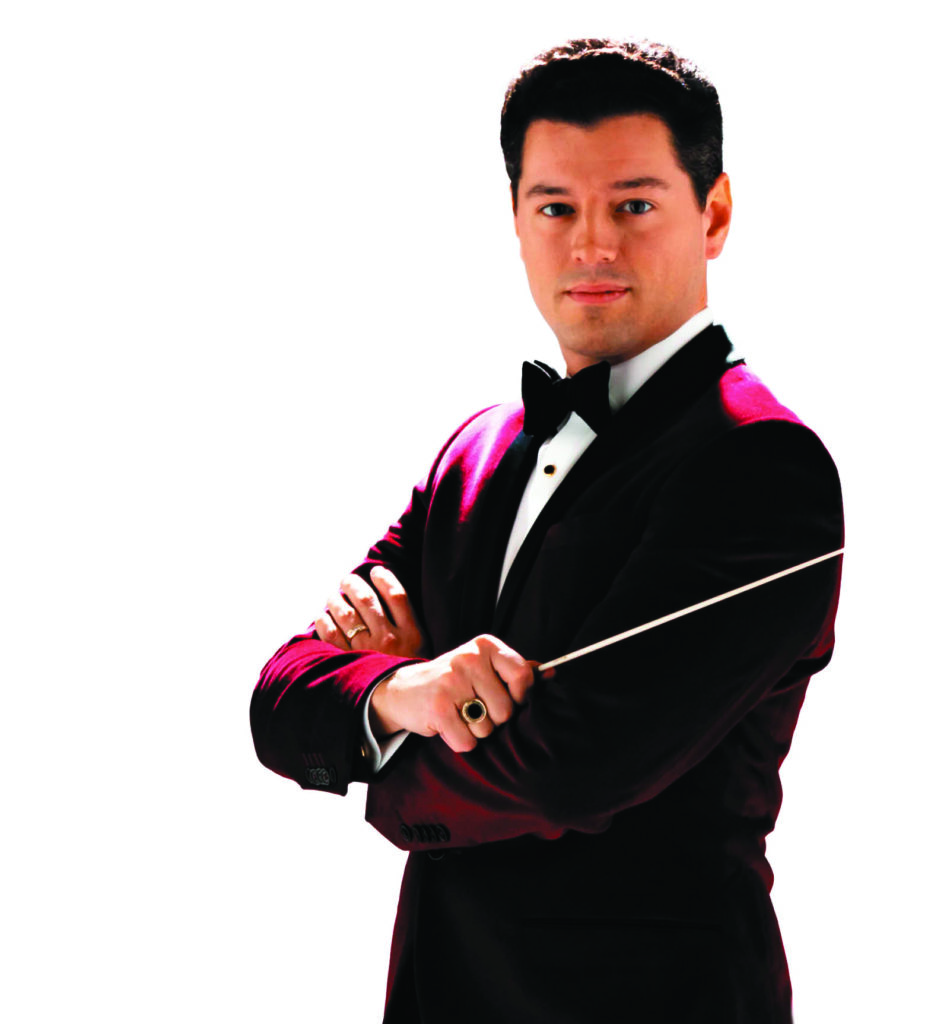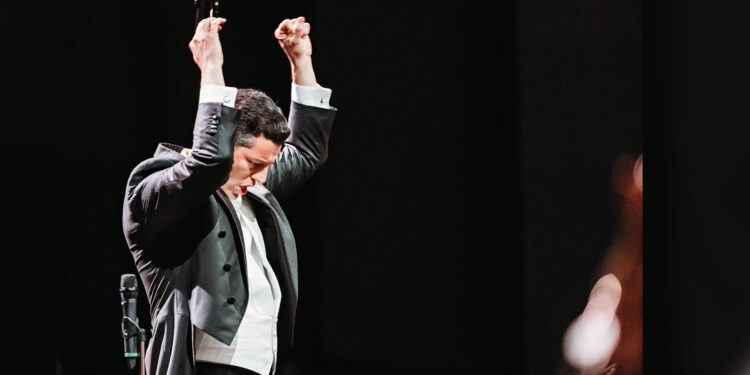Conductor of the Owensboro Symphony
Fresh off a flight clear across America from Rhode Island to his home in LA, Owensboro Symphony (OS) conductor Troy Quinn still had energy to speak with Owensboro Living about some of his favorite moments with the OS.
Based in LA, Troy leads a very busy life with a calendar full of commitments, but happily considers Owensboro his second home. Not only is Quinn the music director of OS, but he is also music director of the Venice Symphony in Florida, music director of the Santa Monica (CA) Symphony Orchestra, and the summer pops conductor for Rhode Island Philharmonic Orchestra. That’s a lot of air miles. Somehow, he also finds time to teach on the conducting faculty at the University of Southern California.
These days it’s very common for community conductors to have more than one commitment. In fact, Quinn says, “Some community conductors fly in from Europe, so my commute is short in comparison.”
During the OS season, Quinn flies to Owensboro at least once a month. When he’s working in Owensboro, he’s most often staying at downtown hotels. “When I’m in town, I’m eating downtown, I’m visiting schools, I go to the bank, I’m out in the community. For me, it feels like I’m on vacation for three months in the off-season and then I go back to Owensboro.”
Quinn loves taking the conductor’s podium so much that he almost can’t get enough. With careful planning up to two years out, he makes it all work. And it certainly helps that he considers OS his primary commitment and builds his out-of-LA appearances around his OS schedule. Now in his sixth year as conductor, and with a recent contract extension, he’s even more focused on taking the OS to the next level.
Owensboro Living thought this was a great time to catch up with Quinn to reflect on his first six years, talk about how the OS adapted to COVID-19, and see what the 21st century conductor is most looking forward to in the next five years in Owensboro.
You could be conducting in much larger cities. What attracted you to Owensboro?
It’s very simple: the people in the community and the people in the orchestra. You hear about southern hospitality and Owensboro encapsulates that. I had experience in many different places, but as soon as I got to Owensboro, I felt a connection that I hadn’t found in other places. The other thing is the talented musicians. People don’t realize how talented the Owensboro Symphony Orchestra is, but it’s a gem. Some of that is because we pull from Evansville or Louisville or Nashville. For me, it was both of those elements. Sure, you need a great symphony, but you also need the community’s backing. I found both in Owensboro, and I love it. My first impression of Owensboro was how beautiful and charming this community is and how supportive of the arts people are.
Over your 6 years here, has Owensboro lived up to that first impression?
Oh absolutely! I travel all over the country conducting orchestras bigger and smaller (than OS), and what Owensboro has is a luxury. Not only the artistic quality and talent, but also the arts scene with RiverPark Center and now the Bluegrass Hall of Fame.
The challenge for me, now, is how to not plateau. We need to grow and continue to move the needle. It would be a shame for us to just be complacent and stay where we are artistically. It’s always my goal to grow and bring something new, creative, and innovative.
How does OS do that?
With my background in Hollywood and experience in other places, I try to bring that multimedia element with video and production to our performances. One example is the video recording of our concert in Cannon Hall that’s going to be airing on KET. During the pandemic, we had to pivot and find new ways to engage the community beyond the concert hall. That’s where the idea for Symphony Stroll at Smothers Park originated, as well as the Summer Salute with Lee Greenwood.
My goal for the next five years is for everybody to know about the Owensboro Symphony Orchestra, not just people in Owensboro, whether that’s this show airing on TV or from clips on YouTube. Hopefully those other experiences will bring people into the concert hall, too. Mixing and blending genres with classical pieces and pop songs and film scores also translates into box office sales. But all of that is a credit to our creative team. It’s not just me.
I really take the programming aspect seriously, but we’re also willing to take risks here and think outside the box. We’re fearless in that way.
For me, music’s either good or bad. If it’s good, let’s do it. What I’ve discovered is that when we blend genres, people will hear something they enjoy but they’ll also discover something else they may never have otherwise. So if we can reach somebody through Lady Gaga, fine! Let’s mix it in. But they’ll also discover Beethoven while they’re here.
Putting things in a fun context is important for our generation. Video is big for us, and mixing disciplines keeps things interesting. For example, last year we did a superheroes concert and we played pieces from Avengers and Batman, but then we played Mahler’s Symphony No. 1 “Titan” which is one of the most epic pieces to perform. I would guess most of those people had never heard Mahler before because they were there for Avengers. But it worked in that context.
I’ve noticed you’ve done several selections from John Williams over the years, which is another great example of pulling from several generations because people will recognize his music from 80s movie soundtracks to 90s and today.
He is our Mozart. He’s been a mentor of mine since I first saw him at the Hollywood Bowl when I was 12 years old. My parents took me, and when I saw John conduct that orchestra and play the theme music from Indiana Jones, I thought it was the coolest thing ever. It became my dream right then to be a conductor one day.
I had no idea that it could be a job. I just thought it was a hobby. I never knew you could make a living as a conductor. I sang in the choir as a boy. Then I learned piano. Then I was singing by rote and by ear. I got an opera degree, if you can believe that. I was heading down that vocal performance road. But I always held the dream of being a conductor in the back of my head.
So when did you realize you were going to do music for a career?
My upbringing was very eclectic from what my parents listened to, and then what I listened to on my own. I wasn’t formally trained until much later. I didn’t know the gifts I had for music until I started training. Then it just became a vocation, not a job. It was like the air I breathed. I just had to do it. There was no decision. I had to.
Eventually, I got my doctorate at USC, which brought me full circle back to LA and got me into film and television. I worked hard, but always in my mind I wanted to conduct. So it came full circle.
Let’s look back, and then we’ll look forward. What was your most memorable moment from Symphony on the Lawn so far?
Well, we haven’t had a rainout yet. Every year I worry. But so far, the weather has always cooperated, which you never know about in Kentucky.
Most memorable moment in Cannon Hall?
Recording the broadcast for KET this past January during Covid when everyone still had to wear masks and everything. It wasn’t just one moment, but the entire experience because it was unlike anything anyone has likely experienced around here. There were seven cameras and jibs and cranes. It was basically a live taping, in front of an audience, but it wasn’t broadcast live. Sometimes we would do multiple takes. So it was memorable for me, for the audience, and for the orchestra. I can’t wait for people to see it.
…And out in the community?

There is a young man who has some severe special needs that always sits at the same spot at the Concert on the Lawn. He always sits right there in front where I conduct, and I give him a high five every year. I think that’s so special because music can communicate in ways that normal communication can’t. That’s the power of music. All the glitz and the glory of the stage is meaningless because what it comes down to is the power of music to transcend and communicate and that’s never more evident than to those with special needs. You also see it with dementia patients. As a conductor, I communicate through gestures, without saying a word, and that is the most powerful thing you can do. So I’m always aware of that when I see those individuals touched by music. That high five is more meaningful to me than Carnegie Hall would be because music is the great equalizer and the great communicator.
Looking ahead to your next 5-6 years, is there anything in particular you are looking forward to?
Expanding our Summer Salute that we started last summer. We also have some great soloists in this next season. Jim Walker is a Kentucky native and one of the greatest flutists ever. I’m excited about violinist Sandy Cameron coming in. She’s a violin prodigy.
The sky’s the limit with OS. We’ve been testing the waters to see what other things we can do outside the concert hall and how we can serve the community. We’ve been talking about playing “live to picture” where the live orchestra plays along to a movie. One of the best concerts we’ve done was called Magical Music of Disney, so we’re hoping to do another Disney themed show.
I’d like to expand the repertoire for the orchestra, too. It’s also about flexing the artistic muscle of the orchestra and challenging them. One of the things I’m very proud of is we have some of the best pay rates in the country for musicians in orchestras our size. So we can attract and retain talent. These folks don’t make a living playing with us. Most of them also teach or do other things on top of OS.
If anyone is hesitant about coming to see the orchestra or thinks the orchestra is not for them, I would invite you to just come try it. I haven’t seen anyone come that wasn’t moved by the music in some way.










